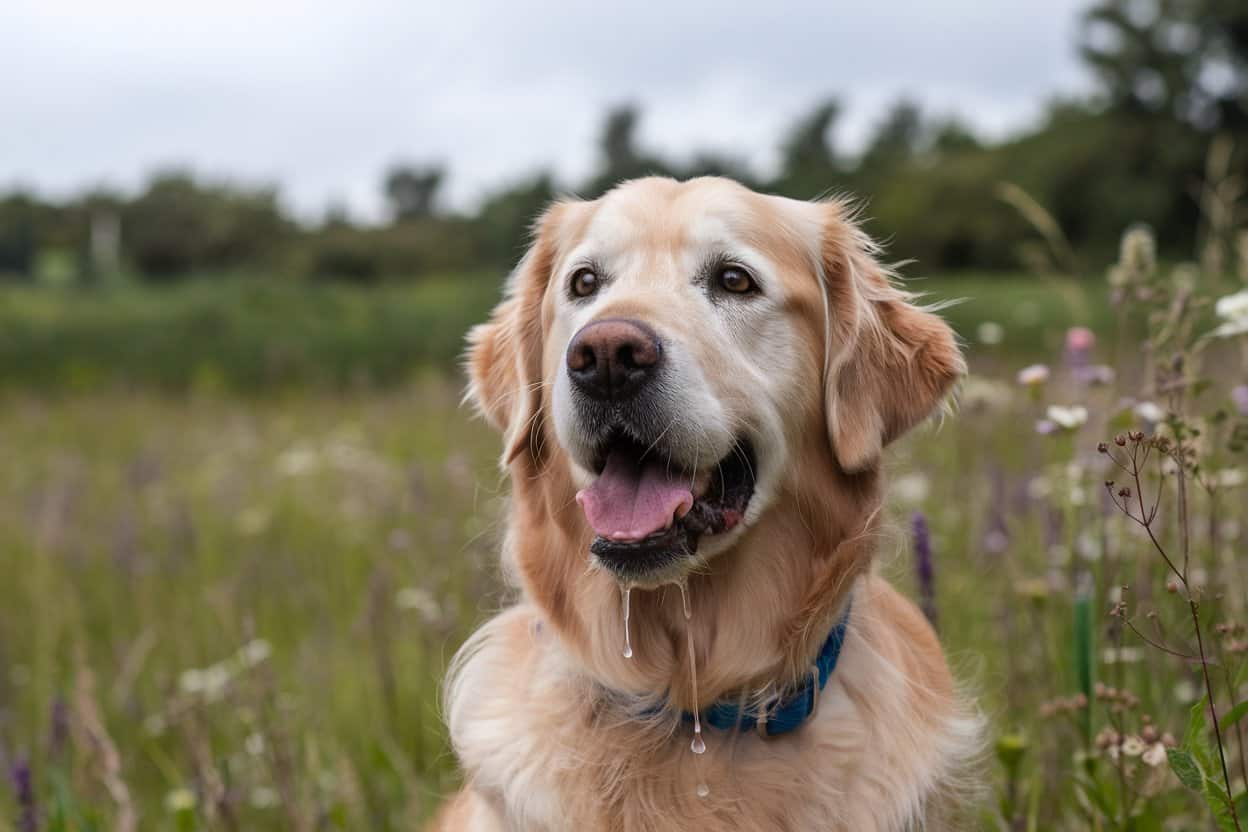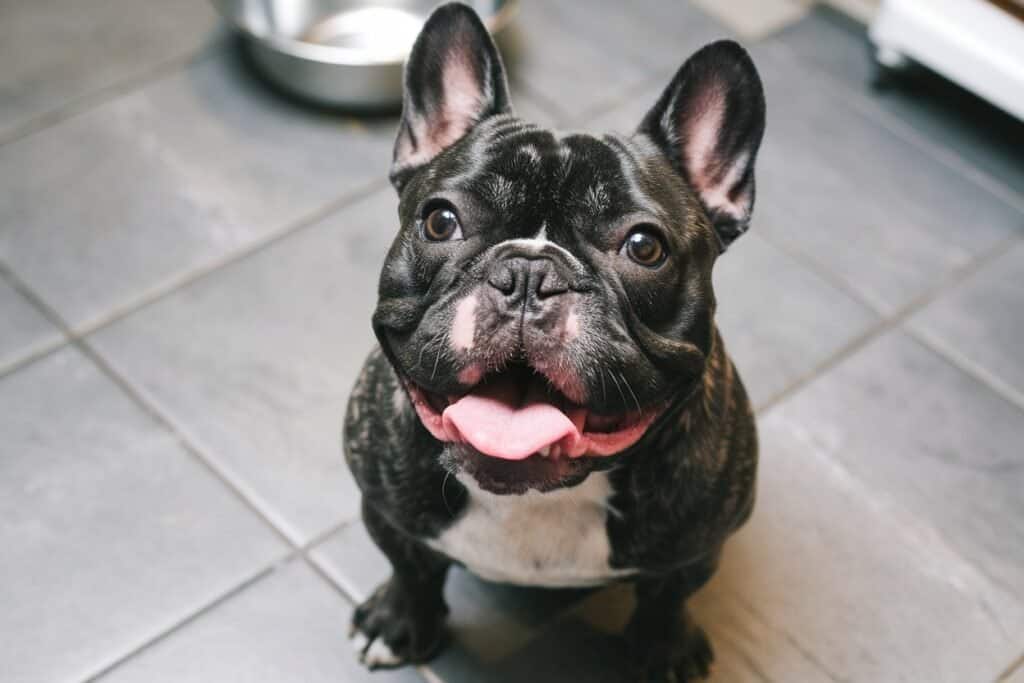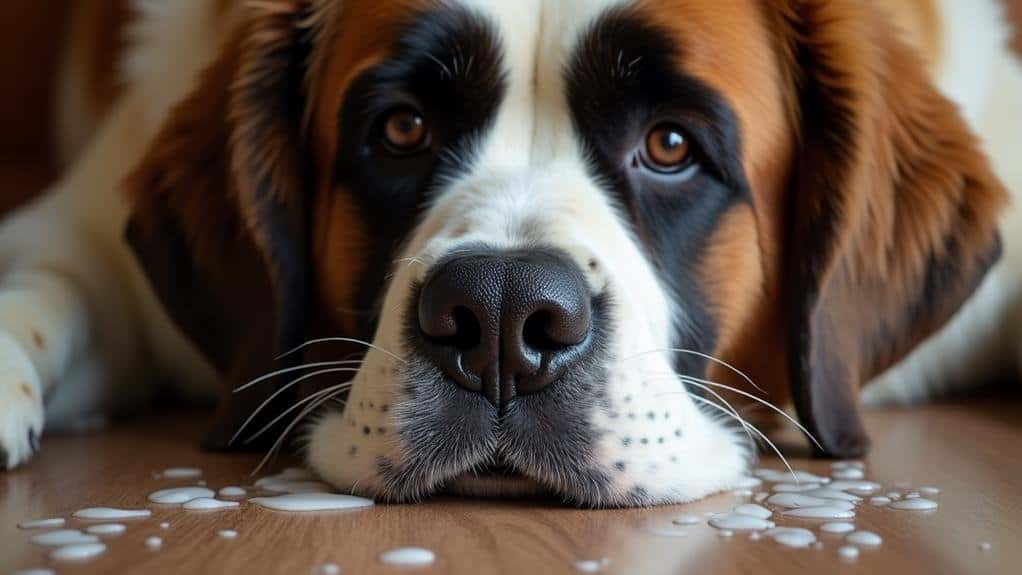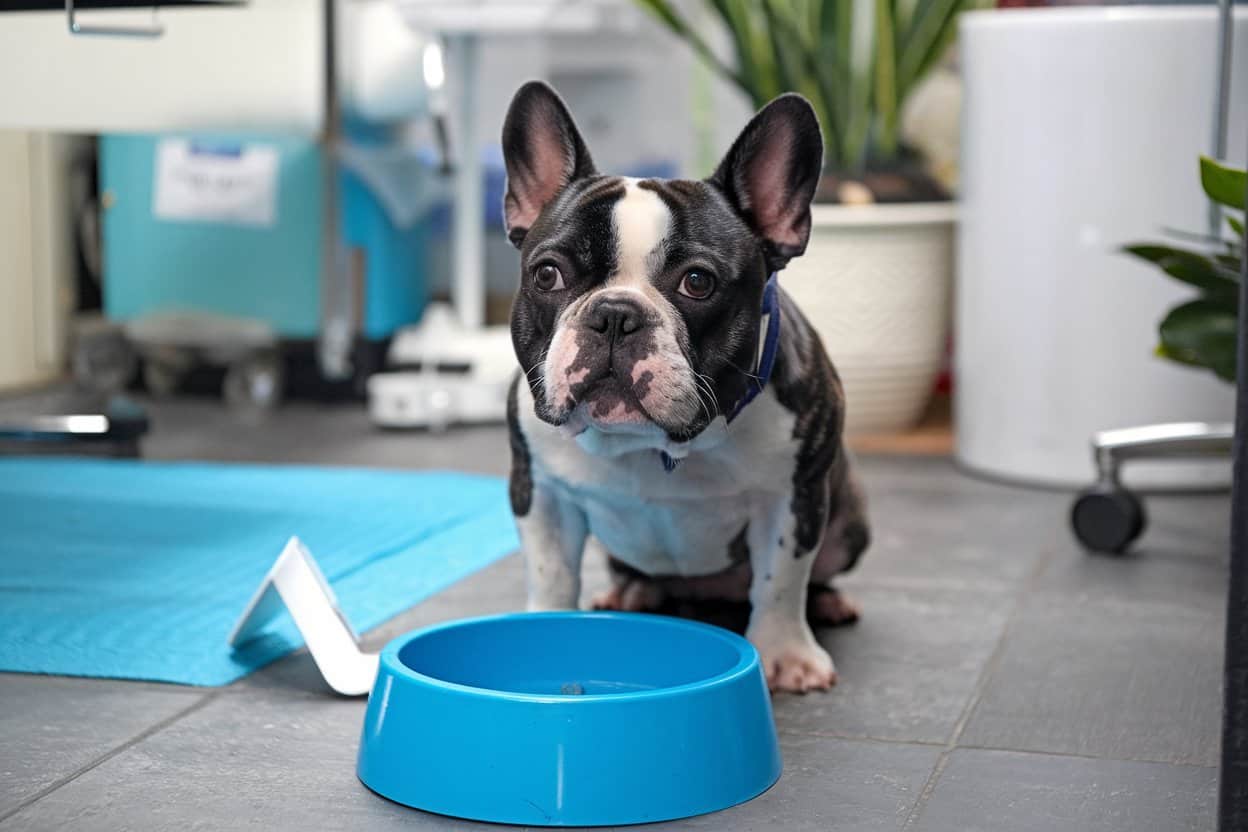Your dog’s drooling might be perfectly normal or a sign of something more serious.
While some breeds are known for their slobbery nature, excessive drooling can indicate dental problems, foreign objects in the mouth, or even heatstroke. Keep an eye out for other symptoms like difficulty eating, pawing at the mouth, or unusual behavior.
If you’re concerned, it’s best to consult your vet for a thorough check-up. They can diagnose the cause and recommend appropriate treatment, from dental cleanings to medications.
Normal Drooling in Dogs

Before you worry about your dog’s drooling, it’s vital to understand what’s normal. Dogs naturally produce saliva, and moderate drooling is actually quite common.
You’ll notice that some breeds, like Mastiffs, Bulldogs, and Bloodhounds, tend to drool more due to their unique facial structures.
Drooling serves important functions for your furry friend:
- It aids in digestion and oral health
- Helps your dog chew food more easily
- Assists in cooling them down during warm weather
It’s normal for dogs to drool when they:
- Get excited
- Anticipate food
- Smell enticing food scents
While occasional drooling is perfectly normal for dogs, it’s important to keep an eye on changes in drooling patterns.
Excessive drooling might indicate underlying health issues, so don’t hesitate to consult your vet if you notice a significant increase.
Causes of Excessive Drooling

Excessive drooling in dogs can stem from various health issues, ranging from mild to severe.
If you’ve noticed your furry friend’s slobber production has kicked into overdrive, it’s time to put on your detective hat and investigate the potential causes.
1. Dental Dilemmas
Your dog’s excessive drooling might be a sign of dental issues, such as periodontal disease or tooth decay. These problems can lead to increased saliva production, making your pup look like they’ve just finished a marathon swim.
2. Uninvited Guests
Foreign objects lodged in your dog’s mouth or throat can be a real pain, causing irritation and prompting extra drool as their body tries to evict the unwelcome intruder.
3. Upset Tummies
Nausea, often linked to gastrointestinal troubles or motion sickness, can turn your dog into a drool factory. Keep an eye out for other symptoms like lip-licking or vomiting.
4. Heat Hazards
Heatstroke is a serious cause of excessive drooling. If your dog’s panting like they’ve just run a 5K and looking lethargic, it’s time for immediate cooling measures.
5. Allergic Adventures
Allergic reactions to food, plants, or insect bites can trigger the waterworks. If you notice other symptoms alongside the drooling, it’s best to consult your veterinarian pronto.
Signs and Symptoms

While excessive drooling is the primary symptom you’ll notice, it’s often accompanied by other telltale signs that can help pinpoint the underlying cause.
As a pet owner, you’ll want to keep an eye out for these additional symptoms:
- Discomfort while eating or drinking
- Lethargy or unusual behavior
- Vomiting or diarrhea
- Swelling or redness in the mouth
- Pawing at the mouth
These signs can indicate various health issues, from dental problems to more serious conditions.
If you spot your furry friend’s fur or surroundings getting unusually wet from drool, it’s time to pay closer attention.
Changes in appetite are another red flag. If your pup’s suddenly turning their nose up at dinner or showing less interest in their favorite treats, it could be cause for concern.
When excessive drooling is paired with a loss of appetite, it’s vital to contact your vet promptly.
Diagnosis and Veterinary Care

When you’ve noticed your dog’s excessive drooling and associated symptoms, it’s time to seek professional help. A veterinary examination is essential for evaluating your furry friend’s drooling habits and identifying any underlying medical issues.
Your vet will perform an oral examination and review your dog’s medical history to get a complete picture of their health.
Diagnostic tests are often necessary to pinpoint the cause of excessive drooling. These may include:
- Blood tests
- X-rays
- CT scans
These tests can help detect foreign bodies, infections, or dental disease that might be causing the problem.
Don’t forget to monitor and report any additional symptoms you’ve noticed, such as changes in appetite or behavior. This information is invaluable to your vet in making an accurate diagnosis.
Treatment Options
Treatment for excessive drooling in dogs varies depending on the underlying cause. Your veterinarian will recommend the most appropriate course of action based on their diagnosis.
Dental Care
If your furry friend’s excessive drooling is due to dental problems or oral issues, they may need a thorough cleaning or even tooth extraction. Don’t worry, though – your pup will thank you for that fresh, pain-free mouth!
Medications
Sometimes, the solution comes in pill form. Your vet might prescribe antibiotics or anti-nausea drugs to tackle the fundamental cause of your dog’s drooling problem.
Surgical Intervention
In more serious cases, such as foreign object removal or tumors, surgery might be necessary. It sounds scary, but it’s often the quickest way to get your slobbery companion back to normal.
Supportive Care
For dogs drooling excessively due to heatstroke or toxin exposure, hydration support is vital. Your vet will guide you through the recovery process.
Allergy Management
If allergies are making your pup drool like a faucet, dietary changes or medications can help manage the symptoms and keep that tongue where it belongs – in their mouth!
Prevention and Management Strategies
With a little planning and proactive care, you can often prevent excessive drooling in your dog or manage it effectively when it occurs.
Start by maintaining your furry friend’s dental hygiene through regular cleanings and at-home care. This can help prevent dental issues that might lead to excessive drooling.
Next, create a calm environment for your pup and provide plenty of enrichment activities. These strategies can help manage stress-induced drooling, keeping your dog happy and less likely to drool excessively.
Be vigilant about your dog’s surroundings, too. Keep an eye out for potential toxins or foreign objects that could cause accidental ingestion and lead to excessive drooling.
If your dog suffers from gastrointestinal disorders or motion sickness, don’t hesitate to consult your veterinarian.
They can recommend dietary adjustments or medications to help manage these conditions and reduce drooling.
Frequently Asked Questions
Is Excessive Drooling in Dogs an Emergency at Night?
Excessive drooling at night can be an emergency for your dog. If it’s sudden, continuous, or accompanied by other symptoms like lethargy or distress, don’t wait. You should seek immediate veterinary care to rule out serious issues.
Why Is My Dog Drooling and Confused?
Your dog’s drooling and confusion could indicate various issues, from dental problems to neurological disorders. It’s best to consult your vet promptly. They’ll examine your pet and may run tests to determine the cause and appropriate treatment.
Do Dogs Drool When in Pain?
Yes, dogs can drool when in pain. You’ll notice excessive drooling if your dog’s experiencing oral discomfort, nausea, or other medical issues. It’s often accompanied by additional symptoms. If you’re concerned, it’s best to consult your veterinarian promptly.
Why Is My Dog Lethargic and Drooling?
If your dog’s lethargic and drooling, it could indicate various health issues. You’ll want to check for signs of nausea, dental problems, or heatstroke. It’s best to consult your vet promptly to rule out serious conditions.

